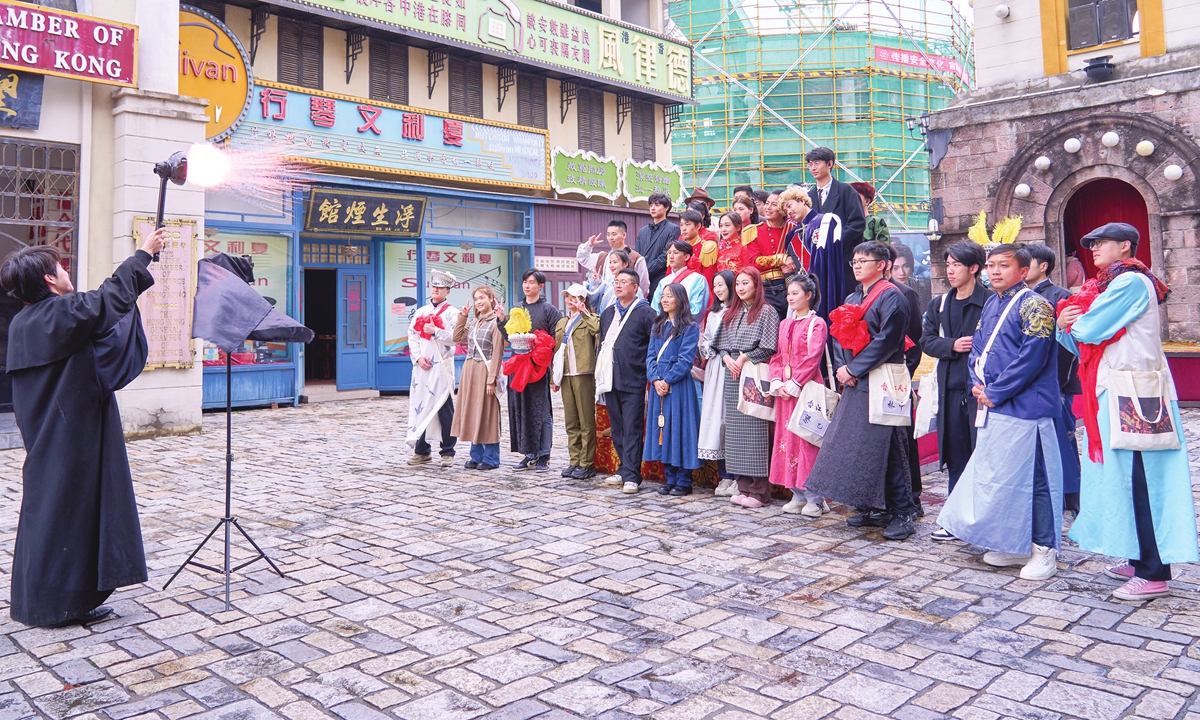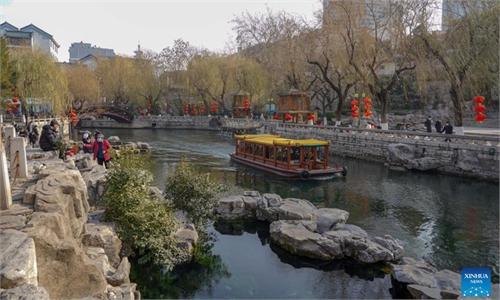ARTS / CULTURE & LEISURE
Young Chinese travelers sparking rise in immersive experiences
More than a vacation

Tourists experience acting at Hengdian World Studios, China's equivalent to Hollywood. Photo: Courtesy of Shan Guanding, Hengdian Group
Dressing up as an ancient Chinese official, middle school student Xiong Changxin takes on the role of Ji Xiaolan, a famous upright official in the Qing Dynasty (1644-1911). Following the instructions of the director, Xiong slowly talks to the "emperor" as the cameras start to roll.
"I was a bit nervous at first," Xiong told the Global Times.
"It was quite fun for me, a very interesting experience."
Xiong is not an actor, but a tourist who took part in an acting activity over the weekend at Hengdian World Studios - China's equivalent to Hollywood — in East China's Zhejiang Province. Hengdian provides acting experience services that allow tourists to try on costumes and act out scenes from hit TV series or films.
The teenager is just one among the numerous Chinese tourists, especially young ones, who are eager to enjoy fresh, highly-interactive experiences during vacations.
Compared with older generations who usually just hang around scenic spots following a tour guide, young tourists like to act on their own initiative and they are more willing to pay to take part in creative and immersive experiences, tourism industry observers said.
Creative, immersive experience services are a new mode of culture and tourism consumption, as well as a new trend in the development of the industry, tourism management scholar Yang Yong, who is also a deputy director of the College of Economics and Management at East China Normal University, told the Global Times.
"It's natural that young Chinese with rich travel experience are less interested in traditional vacations. Their diverse, personalized needs are stimulating a boom in the rise of immersive experience services in tourism," Yang told the Global Times on Tuesday.
The recovery of the travel industry after the COVID-19 pandemic has also created opportunities for the development of this new consumption model, Yang added.
Getting into the role
The immersive experience Xiong enjoyed has been one of Hengdian's most popular services.
Tourists who are interested in acting or who are curious about how TV shows or films are shot can try the service for a few minutes for free, or they can choose to pay a few dozen yuan to wear more elaborate costumes and get a copy of the video Hengdian staffers shoot for them.
The service was so popular during the Spring Festival holidays in January, that "sometimes tourists had to wait in line for costumes to become available," the service's director Zhang Yuzhu told the Global Times.
Hengdian began offering a similar "micro film" shooting service starting in 2016, which mainly targets young tourists such as students, said Zhang Xiaoxia, who is in charge of the micro film shooting project.
"For students, we offer some educational screenplays, in the hope that they can learn something and get to know Chinese culture better through the experience," Zhang told the Global Times.
Similar to Hengdian, many tourist attractions across China have launched immersive experience services such as filming Vlogs and murder mystery experiences. The latter sees tourists play the roles of detectives as they seek for clues throughout the whole scenic area and then put them together to solve a murder case. One experience can last from several hours to three days, the Global Times learned.

A woman participates in the Spartan race in Beijing on September 10, 2022. Photo: Courtesy of SECA
Spartan warriors
For sports enthusiasts, immersive experiences can also make their vacations more interesting.
Gu Shouxuan, a white collar worker in Beijing, said he plans to travel to the countryside to test his limits.
"Doing some extremely exhausting things can help me focus and maybe also help me become physically stronger," said Gu, who is in his 30s.
"It feels great to put my anxieties aside."
Gu, among many other office elites, are planning to travel to Chongli in North China's Hebei Province to participate in the Spartan cross-country race.
Parts of the races see participants try to get past obstacles while carrying heavy objects or getting over barriers that require cooperating with other participants, which Gu believes develops teamwork.
"This event forces me to talk to strangers and overcome obstacles together, which I think is beneficial for work," he said.
The Spartan race's last event in China was held in Shenzhen, South China's Guangdong Province in November 2022. As the travel restrictions have eased in the country, the number of participants is expected to grow further this year.
The Spartan race, originated in ancient Greece, was used to train and test the country's fearsome Spartan warriors, who were known for their courage and endurance.
The modern version of the Spartan race was introduced to China by Shanghai-based sports marketing company SECA in 2016. Obstacle course racing is in talks to become an Olympic discipline for the Los Angeles 2028 Summer Games.
Archery tag, a sport similar to paintball but with bows and arrows, is another sport that some tour groups like to organize for young members during the trips. Many travel agencies in cities like Shenzhen and Huizhou have added this new sport into the trips they plan for clients.
With the development of the metaverse, experts predict that more AR and VR-related technologies will be used in the near future to provide tourists with even more immersive and novel experiences.

